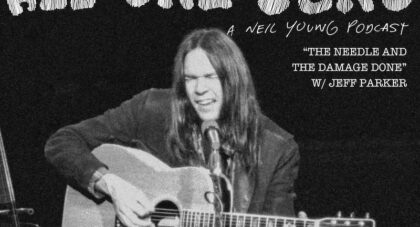Christopher Denny’s If The Roses Don’t Kill Us is the kind of record that sounds as if it’s always existed: a sturdy, twangy blend of southern soul, country, and folk. Denny’s voice — a reedy, high and lonesome thing — is at once alien and familiar. The Arkansas songwriter wields it like a weapon, singing out vivid images drawn from his years of hard living. Following the release of his debut, Age Old Hunger, Denny fell off the grid, self-medicating his severe depression through intense drug use. In recent years, he’s gotten right, or at least more right, he explains, but If The Roses Don’t Kill Us bears Denny’s psychic scars. It’s also defined by his peculiar grace and humor. “I’ve got a song that’s happy and sad, part of it’s good and part of it’s bad,” he sings at the record’s open, and in many ways the lyric sums up Denny’s approach.
Aquarium Drunkard spoke with Denny on the phone from Minneapolis, where he and his tour-managing wife checked in while on the road with Strand of Oaks. Denny explained his songwriting process, but also illuminated his personal concepts of God, love, and forgiveness, ideas that haunt and shade the songs of If the Roses Don’t Kill Us.
Aquarium Drunkard: What can you tell me about the years that separated Age Old Hunger (2007) and If The Roses Don’t Kill Us (2014)? It was a little bit of a stretch there.
Christopher Denny: Well, you know I’ll say this: things got a lot better when I got onto meds. You know, when I got onto anti-depressants and social anxiety medicine. It doesn’t matter really if you’re bipolar or you’re depressed -- the symptoms of those can intertwine [but] once you get meds, and you’re on the right medicines, it doesn’t really matter to you what you are or what you’re called by a psychologist. It just matters that you know there’s something you can take that will make things easier.
The world isn’t really after me anymore, you know? I’m really happy for that. I realized I was trying to self-medicate, you know. I just needed some help. There’s all these things I could tell you [about those years], but then you’d just be writing the same piece everyone else is writing. To look at it from a different angle: I don’t really believe that the world is on my side, but I don’t necessarily believe it’s against me, either. That’s gone. All those years [I spent] shooting up drugs — meth, heroin, cocaine, anything that you could put into a needle and get inside your vein I would do it. I was homeless, all that stuff. I was funneling deeper into my disease. I realized it wasn’t as much addiction to alcohol [and drugs] as much as it was severe depression and paranoia.
AD: If someone asked me, “Hey, play me a Christopher Denny song,” I’d play them “Happy Sad.” I love the juxtaposition of those ideas — there’s some humor in your sadness, and there’s definitely some sadness in your humor.
CD: What’s funny is I was sitting on the back porch with my wife, it was right after we had gotten off methadone, when we got clean. We had just gotten off of that, and we were sitting outside, just getting back into smoking reefer. We’d smoked a bowl, and I was goofing around with that song. I wasn’t trying to make something, I just let it come out completely. It’s a subconscious thing, just letting it flow, not expecting it to go on the album. The original words were, “This part is sad, this part makes you cry like a little bitch. This part is happy, and it makes you wanna drink,” but we changed that. [Laughs] It’s just one of those things. Magic.
AD: Another one of favorite lyrics on the record is “God’s Height.” Where did the phrase come from? Is that an expression you’ve heard used?
CD: No, that was just something that came out. People seem to think I had to hear that somewhere, but honestly that wasn’t the case. I was dealing with some insecurity, about my divorce [from my first wife]. And you know, physically she was taller than me. Everything that comes out of me and is good happens when I get out of my own way and just let it go. I have an appreciation for the way the older generation talks. Nowadays people say things so blatantly and it sounds stupid. But to say something in a sly way, without being just an asshole, that’s when you’re succeeding. That’s where the lyrics come from, that place.
Only the good shit. Aquarium Drunkard is powered by its patrons. Keep the servers humming and help us continue doing it by pledging your support.
To continue reading, become a member or log in.


